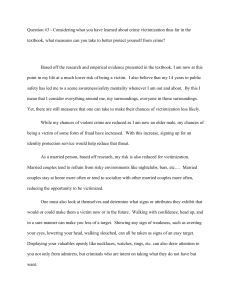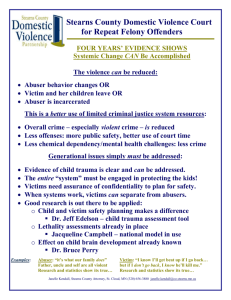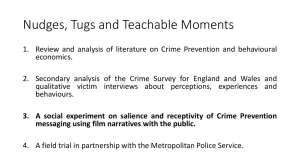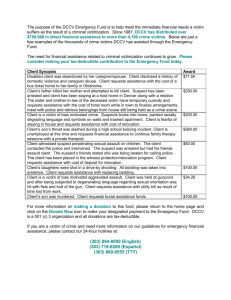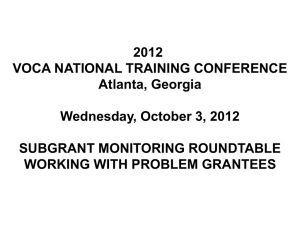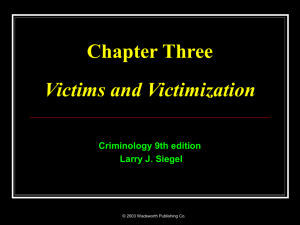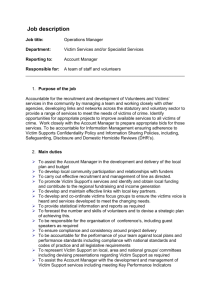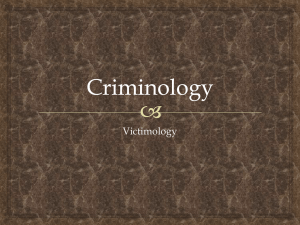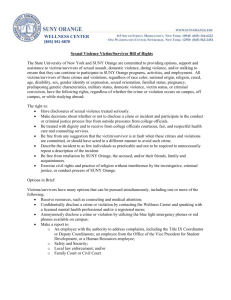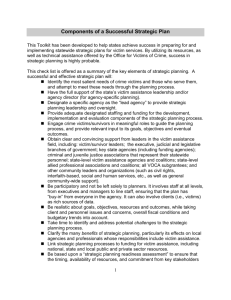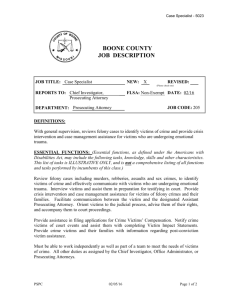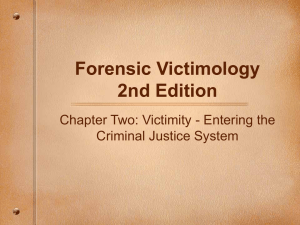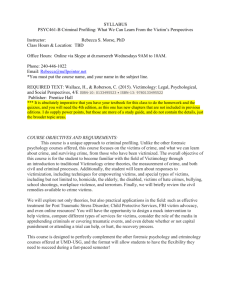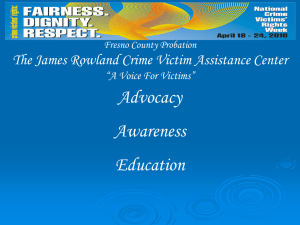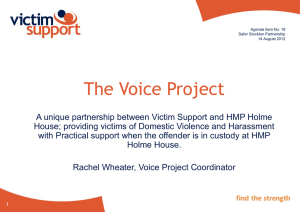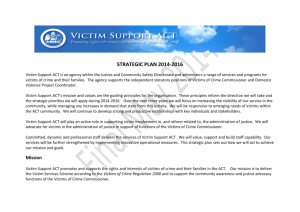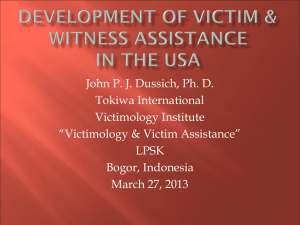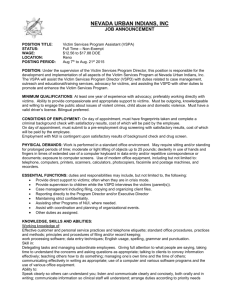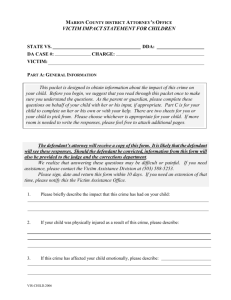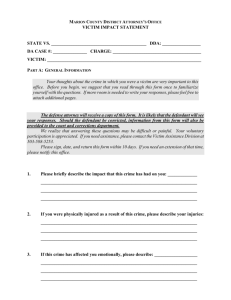CAP TIPS
advertisement
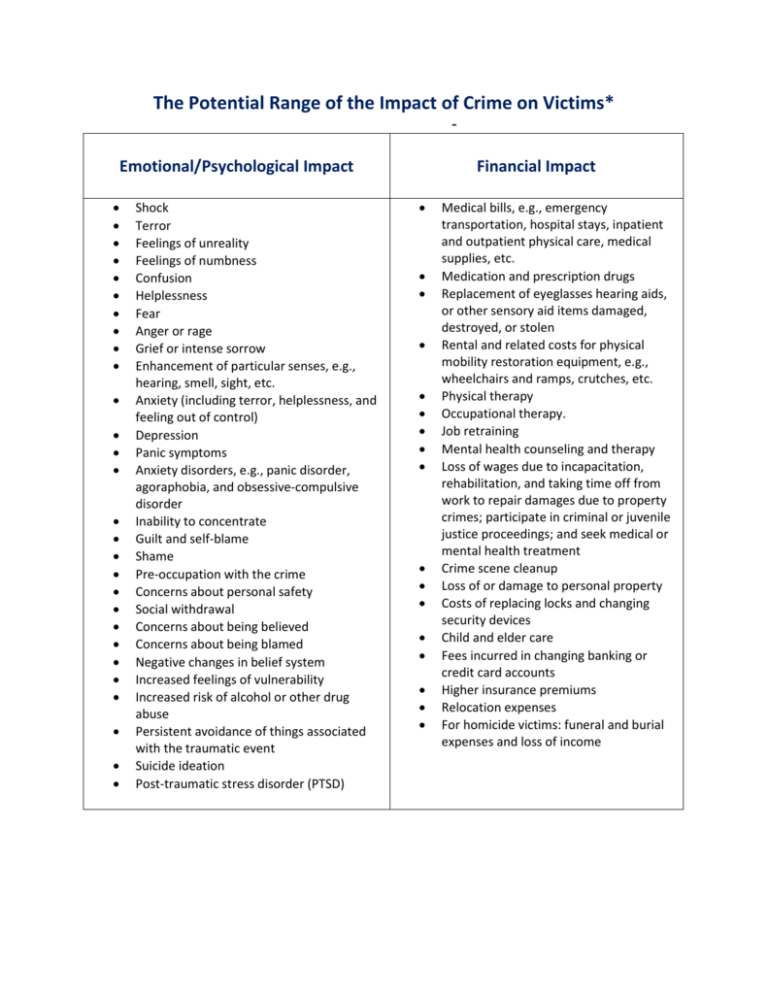
The Potential Range of the Impact of Crime on Victims* - Emotional/Psychological Impact Shock Terror Feelings of unreality Feelings of numbness Confusion Helplessness Fear Anger or rage Grief or intense sorrow Enhancement of particular senses, e.g., hearing, smell, sight, etc. Anxiety (including terror, helplessness, and feeling out of control) Depression Panic symptoms Anxiety disorders, e.g., panic disorder, agoraphobia, and obsessive-compulsive disorder Inability to concentrate Guilt and self-blame Shame Pre-occupation with the crime Concerns about personal safety Social withdrawal Concerns about being believed Concerns about being blamed Negative changes in belief system Increased feelings of vulnerability Increased risk of alcohol or other drug abuse Persistent avoidance of things associated with the traumatic event Suicide ideation Post-traumatic stress disorder (PTSD) Financial Impact Medical bills, e.g., emergency transportation, hospital stays, inpatient and outpatient physical care, medical supplies, etc. Medication and prescription drugs Replacement of eyeglasses hearing aids, or other sensory aid items damaged, destroyed, or stolen Rental and related costs for physical mobility restoration equipment, e.g., wheelchairs and ramps, crutches, etc. Physical therapy Occupational therapy. Job retraining Mental health counseling and therapy Loss of wages due to incapacitation, rehabilitation, and taking time off from work to repair damages due to property crimes; participate in criminal or juvenile justice proceedings; and seek medical or mental health treatment Crime scene cleanup Loss of or damage to personal property Costs of replacing locks and changing security devices Child and elder care Fees incurred in changing banking or credit card accounts Higher insurance premiums Relocation expenses For homicide victims: funeral and burial expenses and loss of income Physical Impact Physiological anxiety (including rapid heart rate, hyperventilation and stomach distress) Physical injuries (such as gunshot wounds, lacerations, broken bones, sprains, burns, etc.) Physical injuries that lead to other health conditions (such as heart attack, stroke, fractures from falling, loss of dexterity, etc.) Increased risk of cardiac distress, irritable bowel syndrome, chronic pain, and sexual dysfunction Permanent disability Disfigurement Immune disorders that increase the potential for infectious diseases Substantial lifestyle changes, including restriction of activities once enjoyed Lethargy and body fatigue Sleep disorders Loss of appetite, excessive appetite, or eating disorders. Decreased libido and sexual dysfunction Inability to work Increased risk of future victimization For sexual assault victims: possible exposure to sexually transmitted diseases; exposure to HIV; and unwanted pregnancy Social Impact Detrimental effect on overall quality of life Acute and chronic disruptions to family life Disruptions to and negative changes in important relationships Changes in lifestyle Isolation Restrictions on personal behaviors Negative impact on overall productivity Increased fear of crime Increased risk of future victimization Changes in pre-crime beliefs about the world Changing view of the world: o As a “safe place” o Difficulty in trusting self o Difficulty in trusting others o Seeking a personal sense of “justice” “Ripple effect” on: o Families o Neighborhoods o Schools o Workplaces o Communities Spiritual Impact In an attempt to understand events that make no sense, people who do and do not engage in religious practice often turn to the spiritual beliefs with which they were raised. These spiritual insights are sometimes helpful but, more often than not, victims express disappointment in their faith communities’ reactions. All religions accept human suffering as a component of the human experience, but understand its role differently. Hindus and Buddhists understand the role of karma in tragic events and seek to accept what has happened rather than seek justice. Jews believe that God expects human beings to act in kindness to one another, and when they do not, justice is sought and forgiveness must be earned. The wide gamut of Christianity practiced in the United States includes all perspectives from acceptance as “God’s will” and forgiveness of offenders to strong drives for justice in the secular arena. Muslims believe they have a special mission from God/Allah to create a just society. Other than the radical fringe, they condemn violence and willingly participate in the justice system. It’s IMPORTANT to Remember!.... Every victim is unique! Every case is unique! Every victim should receive a personal needs assessment, with case planning to identify and address individual needs Each victim’s reaction to crime and ability to cope are affected by a variety of factors: o Prior victimization history o Prior mental health or substance abuse problems o Degree of social support in the aftermath of crime o Degree of exposure to the criminal justice system, and the victim’s perception of this experience A victim advocate, family member or friend may be the first person from whom a victim seeks help, or the only person….. * By Anne Seymour and Janice Harris Lord (updated February 2014)
